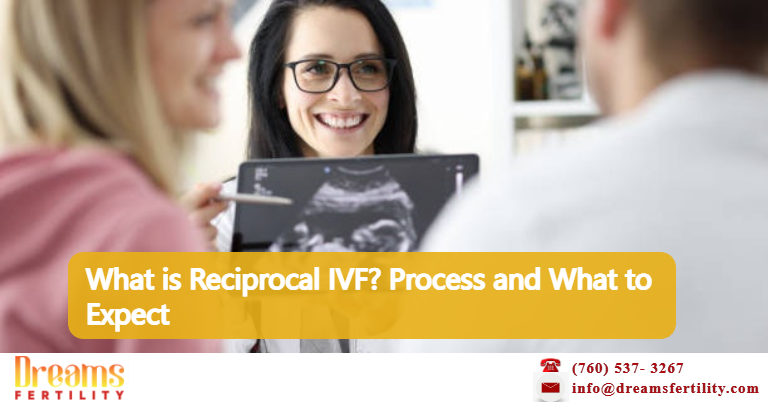Reciprocal in vitro fertilization (IVF) is a process that allows women and transgender men to reproduce by having one partner serve as the egg donor to the other. This allows couples who do not have a sperm-producing partner in the relationship to experience the biological aspect of pregnancy.
If you and your partner have considered reciprocal IVF as a potential option for reproduction, this guide should help answer some questions that you might have about the process and what to expect. First, let’s discuss how the process allows both partners to reproduce.
How Reciprocal IVF Works: The Basics
As we mentioned above, reciprocal IVF involves one non-sperm-producing partner donating their egg to the other to carry the pregnancy. This is done through a process of retrieving eggs from the ovaries and fertilizing them with donated sperm in a lab. The embryos are then biopsied for PGT analysis and frozen for a frozen embryo transfer after the analysis is complete. Only normal embryos will be transferred to the partner’s uterus.
Following this step, the tested embryos are then thawed and transferred to the uterus of the partner who will carry the pregnancy.
A New Way of Creating a Family Bond
While the partner that donates the egg is the genetic parent of the child, the one who is carrying the child for 9 months is able to develop a similarly close bond through the processes of pregnancy, delivering the baby, and nursing post-birth. This provides each partner with a deep connection to their child, regardless of not sharing a genetic connection with one parent.
Determining Who Should Donate and Who Should Carry
During a fertility consultation, a doctor will examine both partners’ reproductive health to determine which person will be best suited for egg donation and carrying the pregnancy, respectively. The examination might review factors such as:
- Ages of the partners
- Past pregnancies of either partner, if any
- Ovarian reserves of each partner
- Any chronic or pre-existing conditions that either partner has
- Physical health of either partner
However, the examination is clinical in its nature and may not account for other factors. A transgender father may desire to be the egg donor before starting their testosterone treatments and may not wish to undergo pregnancy.
Beyond medical conversations, both partners should have a personal discussion about which person should donate and who should become pregnant. This will help ensure a more emotionally healthy and happier reproductive process for starting or expanding your family.
What to Expect During the Reciprocal IVF Process
The reciprocal IVF process is very similar to traditional IVF, but with a few key differences. First, as we mentioned earlier, reciprocal IVF requires two procedures – one to retrieve eggs from the ovaries and another frozen embryo transfer to implant embryos in the uterus.
Second, reciprocal IVF requires hormone treatments for both partners. The partner who is donating their eggs will have to take medication to stimulate egg production in the ovaries. The partner carrying the pregnancy will also have to take medication to prepare the uterus for implantation.
The reciprocal IVF egg donation process typically takes about four to eight weeks from start to finish. During this time, the partner providing the eggs will take medication to stimulate egg growth in their ovaries and will be required to make several trips to the fertility clinic for, monitoring blood tests, and ultrasounds.
Reciprocal IVF with Dreams Fertility:
The egg retrieval will happen in the Dreams IVF lab in Laguna Hills. Once the eggs are retrieved, they will be fertilized with donor sperm and grown to blastocyst stage embryos, which takes about five days.
Then, the embryos will be biopsied for PGT-A analysis to make sure they are normal. If the gender of each embryo is desired to be known, the analysis will also provide this information. After the biopsy, the embryos are frozen while the analysis is done.
Once the PGT-A report is delivered and reviewed with the patients, the frozen embryo transfer will be scheduled for the other partner who will be carrying the pregnancy. This person will be brought in for an ultrasound and possible fluid ultrasound to make sure the uterus is clear to carry the pregnancy.
The partner will then be prescribed medication to prepare the uterus to receive the embryo. The partner will have to come to the Dreams Fertility Palm Springs office several times to monitor the lining of the uterus.
The frozen embryo transfer will also take place at the Dreams Fertility surgery center in Laguna Hills. This FET can be scheduled at a convenient time for both partners’ schedules.
After the frozen embryo transfer is complete, it usually takes about two weeks for the pregnancy test to come back. From there, the pregnancy will progress just like any other.
Are There Risks Associated with Reciprocal IVF?
As with traditional IVF, reciprocal IVF does come with some risks. These include the risks of:
- Ovarian hyperstimulation syndrome (OHSS)
- Multiple pregnancy
- Miscarriage
It is important to consult with your doctor about all the potential risks and side effects before starting reciprocal IVF. Once pregnancy has occurred, the patient will be monitored for the first trimester to make sure the pregnancy is progressing properly before graduating to their ob/gyn. They will need to be sure to regularly attend scheduled checkups and follow-up appointments with their ob/gyn through the rest of the pregnancy.
Get Started on Your Reciprocal IVF Journey Today
Reciprocal IVF is an exciting fertility option for couples who want to have a child together but are unable to do so using traditional methods. By learning about the process and what to expect, you can help ensure a smooth and successful experience.
At Dreams Fertility, we help couples achieve a path to a healthy and happy pregnancy from our office in Palm Springs, CA. If you are looking to start your own reciprocal IVF journey, contact us today to learn more.

Dr. Luis Murrain joined Dreams Fertility in 2021, providing specialty services in Fertility and Reproductive Genetics. With a shared vision that everyone deserves to have the family of their dreams, we are dedicated to helping all of our patients. We believe that families come in all shapes and sizes, and all of them are beautiful. We are proud to have a long history of providing services to all, including gay, lesbian, and transgender individuals and couples on their road to parenthood.

